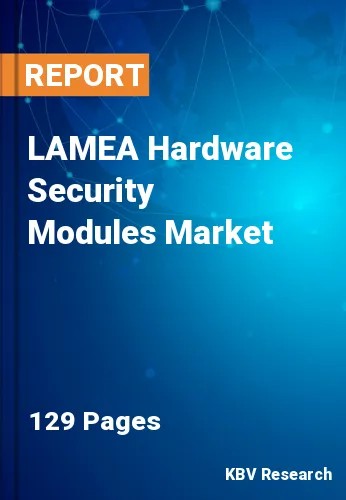The Latin America, Middle East and Africa Hardware Security Modules Market would witness market growth of 16.7% CAGR during the forecast period (2022-2028).
HSMs may have tamper-resistant or tamper-proof features. For instance, hardware security modules may display logging and alerting indicators or become dysfunctional if tampered with. Upon detecting tampering, various HSMs may erase keys. To prevent bus probing or manipulation, hardware security modules are typically equipped by tamper obvious, tamper resistant, or tamper responsive packaging and comprise one or more crypto processor chips or perhaps a module including a mix of chips.
HSMs are frequently a part of mission-critical infrastructures, such as an online banking service or a public key infrastructure, and can thus be clustered for high availability. Some hardware security modules facilitate business continuity and meet the high-availability needs of data center settings. Performance-critical applications that must use HTTPS (SSL/TLS) might benefit from the usage of an SSL Acceleration HSM by offloading the RSA operations, which need several big integer multiplications, from the CPU to the HSM.
Typical HSM devices may execute between one and ten thousand 1024-bit RSA operations per second. The importance of performance with longer key sizes is rising. In order to alleviate this issue, certain HSMs now offer ECC. Specialized HSM devices may do 20,000 operations per second or more. Private keys for cryptocurrencies can be saved on an HSM in a cryptocurrency wallet. HSMs are used by a growing number of registries to store the key material necessary to sign massive zone files. Open DNSSEC is an open-source application that manages DNS zone file signing.
The utilization of the internet is expanding in the region. Because Africa has traditionally lacked economic infrastructure, such as telecom landlines, banks, etc., the idea of success in this sector is based mostly on technological advances that do occur inside the region. The International Trade Administration estimates that by 2025, Africa will have more than 500 million online buyers, creating a market with a compound annual growth rate of 17%. By 2021, 69% of all web traffic in Africa was driven by mobile devices, and by 2040, it is anticipated that mobile devices would dominate almost the entire market in the region.
The Brazil market dominated the LAMEA Hardware Security Modules Market by Country in 2021; thereby, achieving a market value of $45.9 million by 2028. The Argentina market is showcasing a CAGR of 17.4% during (2022 - 2028). Additionally, The UAE market would register a CAGR of 16.4% during (2022 - 2028).
Based on Deployment Type, the market is segmented into Cloud and On-premise. Based on Application, the market is segmented into Payment Processing, Authentication, Database Encryption, Code & Document Signing, Application-level encryption, PKI & Credential Management, and Security Sockets Layer (SSL) & Transport Security Layer (TSL). Based on Type, the market is segmented into LAN Based/ Network Attached, PCI-Based/ Embedded Pluggins, and USB Based/ Portable & Smart Cards. Based on Vertical, the market is segmented into BFSI, Public Sector/ Government, Aerospace & Defense, and Medical & Life Sciences. Based on countries, the market is segmented into Brazil, Argentina, UAE, Saudi Arabia, South Africa, Nigeria, and Rest of LAMEA.
Free Valuable Insights: The Global Hardware Security Modules Market is Predict to reach $2.2 Billion by 2028, at a CAGR of 12.8%
The market research report covers the analysis of key stake holders of the market. Key companies profiled in the report include Microsoft Corporation, Amazon.com, Inc., IBM Corporation, Microchip Technology, Inc., Thales Group S.A., Atos Group, Futurex LP, STMicroelectronics N.V., Lattice Semiconductor Corporation and Infineon Technologies AG
By Deployment Type
By Application
By Type
By Vertical
By Country
Our team of dedicated experts can provide you with attractive expansion opportunities for your business.

